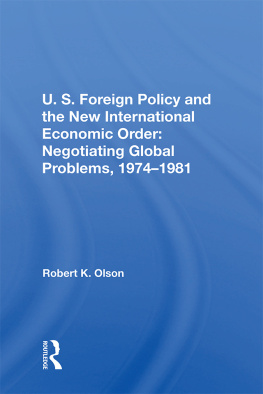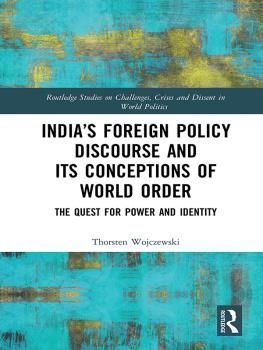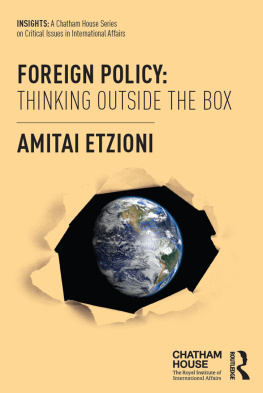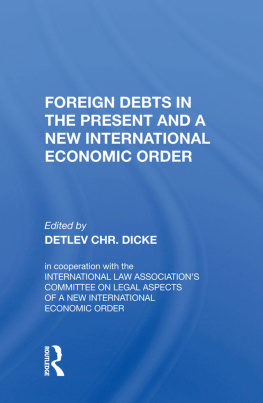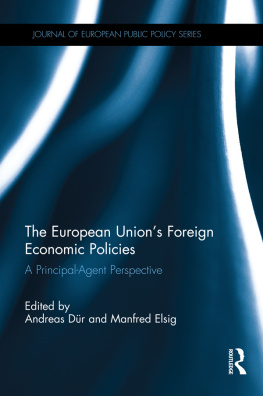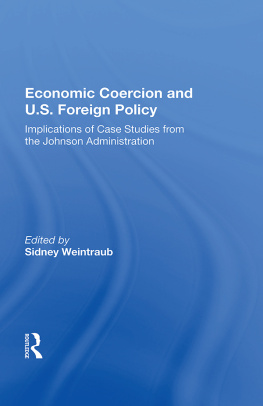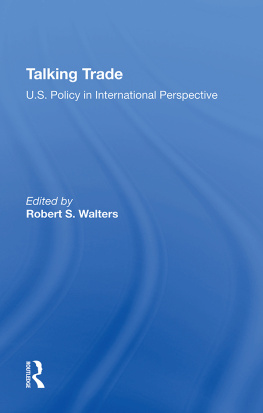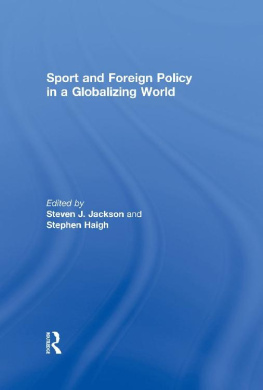U.S. Foreign Policy and the New International Economic Order
About the Book and Author
U.S. Foreign Policy and the New International Economic Order: Negotiating Global Problems, 1974-1981
Robert K. Olson
This is an up-to-date, authoritative account of the development of U.S. policy toward the New International Economic Order (NIEO) from its inception in 1974 through the Eleventh Special Session of the General Assembly in August-September 1980. Mr. Olson concentrates on the latter stages of the North-South dialogue, analyzing U.S. policy in the context of broad foreign policy objectives pursued since the end of World War II and also in light of events of the seventies and the 1980 Soviet invasion of Afghanistan, On the premise that policy is, ultimately, what happens at the negotiating table, he also specifically examines the record of U.S. negotiations on the Common Fund, unctad v, and other major North-South meetings during 1979-1980. This material, together with an examination of how policy is made within the U.S. bureaucracy, who makes it, and why, provides fresh insight into a complex process.
Mr. Olson seeks to determine if and to what extent U.S. policy serves basic U.S. interests and whether the negotiating process has been an effective medium for global problem solving. He concludes that although U.S. policy and practice do serve traditional U.S. foreign policy interests, the political cost is high. He also concludes that nieo negotiations have not been an effective means for global problem solving and that rapid change in political and economic realities has rendered obsolete the basic conceptsthe very mechanisms for problem solving on both sides.
Robert K. Olson is a retired U.S. Foreign Service officer and a former official of the U.S. Department of State. He was directly involved in the early stages of the negotiations described in this book and recently spent two years at the University of Oxford studying the diplomatic processes for global problem solving.
Future historians may view the second half of the twentieth century not so much as a power conflict between the Soviet Union and the United States, but as a period of challenge to the North Atlantic Community, thrown out by the unexpectedly rapid rise of non-Western peoples to an ever-growing voice in world affairs.
Hans Kohn Is the Liberal West in Decline?
U.S. Foreign Policy and the New International Economic Order: Negotiating Global Problems, 19741981
Robert K. Olson
First published 1981 by Westview Press, Inc.
Published 2018 by Routledge
52 Vanderbilt Avenue, New York, NY 10017
2 Park Square, Milton Park, Abingdon, Oxon OX14 4RN
Routledge is an imprint of the Taylor & Francis Group, an informa business
Copyright 1981 Taylor & Francis
All rights reserved. No part of this book may be reprinted or reproduced or utilised in any form or by any electronic, mechanical, or other means, now known or hereafter invented, including photocopying and recording, or in any information storage or retrieval system, without permission in writing from the publishers.
Notice:
Product or corporate names may be trademarks or registered trademarks, and are used only for identification and explanation without intent to infringe.
Library of Congress Catalog Card Number: 81-11682
ISBN 13: 978-0-367-21231-5 (hbk)
To Yvonne, with love, and to Happy Days at Stork Cottage
- ABM antiballistic missile
- ACAST Advisory Committee for the Application of Science and Technology for Development (UN)
- ACP African, Caribbean, and Pacific (countries signatory to the Lom Convention)
- AID Agency for International Development (U.S.)
- CERDS Charter of Economic Rights and Duties of States (UN)
- CIEC Conference on International Economic Cooperation
- COW Committee of the Whole (UNGA)
- DAC Development Assistance Committee (OECD)
- DC developed country
- EB Bureau of Economic and Business Affairs (U.S. State Department)
- EC European Community
- ECDC economic cooperation among developing countries
- ECGF export credit guarantee facility
- ECOSOC Economic and Social Council (UN)
- FAO Food and Agriculture Organization (UN specialized agency)
- G-77 Group of 77: developing country economic negotiating bloc
- GA General Assembly (UN)
- GAO General Accounting Office (U.S.)
- GATT General Agreement on Tariffs and Trade
- Group B Western developed country members of UNCTAD GSP generalized system of preferences
- GSTP global system of trade preferences among developing countries
- IAEA International Atomic Energy Agency
- IBRD International Bank for Reconstruction and Development (World Bank)
- ICA International Commodity Agreement
- IDA International Development Association
- IEA International Energy Agency (OECD)
- IFTD international fund for trade and development
- ILO International Labour Organisation (UN specialized agency)
- IMF International Monetary Fund
- IO Bureau of International Organization Affairs (State Department)
- IPC Integrated Programme for Commodities (unctad)
- IWA International Wheat Agreement
- IWC International Wheat Council
- LDC developing country (less developed country)
- LLDC least developed country
- MBFR mutual and balanced force reduction
- MDB multilateral development bank
- MNE multinational enterprise
- MTN multinational trade negotiations
- NATO North Atlantic Treaty Organization
- NIEO New International Economic Order
- NTB nontariff barrier
- ODA official development assistance
- OECD Organization for Economic Cooperation and Development
- OMB Office of Management and Budget (U.S.)
- OPEC Organization of Petroleum Exporting Countries
- RBP restrictive business practice
- RDB regional development bank
- RTA retroactive terms adjustment
- R&D research and development
- SALT Strategic Arms Limitation Talks
- SDR special drawing rights
- SEATO Southeast Asia Treaty Organization
- STABEX European Community ldc export commodity stabilization system
- STO state trading organization
- S&T science and technology
- TDB Trade and Development Board
- TNC transnational corporation
- UNCSTD UN Conference on Science and Technology for Development
- UNCTAD UN Conference on Trade and Development
- UNDP United Nations Development Program
- UNESCO United Nations Educational, Scientific, and Cultural Organization (specialized agency)
- UNGA United Nations General Assembly
- UNIDO United Nations Industrial Development Organization (specialized agency)
- WCARRD World Conference on Agrarian Reform and Rural Development
- WHO World Health Organization (UN specialized agency)
- WIPO World Intellectual Property Organization
The most pervasive factor dealt with in this study is change. During the writing of this book, the central subject, the foreign policy of the United States, has undergone a sea change following the invasion of Afghanistan, from a mood of withdrawal from overseas commitments to resumption of a global outlook and, following the 1980 elections, to a mood of confidence and self-assertion. International relations, as in the Middle East, seem constantly to fluctuate and change. We are ever aware that the world is moving inexorably into a new era dimly perceived but promising to be radically different from the present. It has become fashionable to see the times in terms of instability and revolution, and U.S. leaders have repeatedly referred to this era as one of tumult and disorder.

